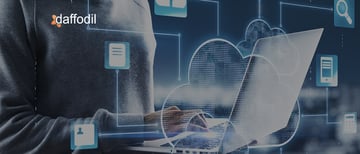
Machine Learning (ML) is an application of Artificial Intelligence that has the maximum number of use cases, in almost every industry. Healthcare, automobile, marketing, finance, agriculture, retail- all of them are leveraging the power of ML to automate tasks and bring agility to operations.
The possibilities with ML are endless and thus, to manage its extensive and scalable use cases, businesses require a dedicated team to handle ML operations. With this necessity, the tech industry experienced the invention of Machine Learning Operations (MLOps).
MLOps is trending and CTOs are exploring the benefits, challenges, and best practices associated with it. The latter segment of this post explains the concept of MLOps, its components, and how it can benefit businesses. Let’s get started.
What is Machine Learning Operations (MLOps)?
The process of developing the ML model is experimental. Artificial intelligence engineers often face failures while building and training an ML model. Thus, this evolving discipline requires reliable processes and measures to reduce ML model development time.
MLOps involves a development culture and practice that unites the ML model development (Dev) and ML model operation (Ops). It includes automation and monitoring at all steps of ML model engineering- integration, testing, releasing, deployment, and infrastructure management.
- MLOps aims to regulate the development cycle of the ML model by bringing data, security, infrastructure, and development teams together.
- MLOps helps to take a modular approach to ML model development. This helps to figure out the problems and start working towards what could work out.
The three key components of MLOps are Machine Learning, DevOps (IT), and Data Engineering. These components are closely connected to managing the lifecycle loop within an organization.
FACT FILE: MLOps accounts for 25% of GitHub’s fastest-growing projects.
How MLOps Simplify ML Model Development?
Model deployment is simplified: Data scientists use several languages, tools, and frameworks to build a machine learning model. When there is MLOps, the operations team has the advantage of deploying models from various languages and frameworks in the production environment.
Monitor model development: The tools for monitoring software development vs those for ML model development are completely different. MLOps practices are specifically designed for monitoring machine learning.
Consider a simple example. Data drift is one of the prime reasons why a model’s accuracy degrades over time. For machine learning models, this drift is the change in model input data that eventually impact the performance of the model. Thus, it is essential to detect model performance issues on time. Data drift detection is one example of how MLOps can help to handle the inconsistencies in the ML model, thereby automating the monitoring process.
Manage model life cycle: MLOps practices are a great way for managing the ML models. MLOps tracks and updates the models in production without interrupting the business applications,
Ensure model governance: ML model development is a cycle of success and failures. To prevent any unwanted changes in this agile process, it is important to comply with regulations. MLOps provides access control, audit trails, and traceability that help to minimize the risk and ascertain regulatory compliance.
MLOps vs DevOps: What’s the Difference?
DevOps is a popular practice of managing the development and operations of software applications on a large scale. The benefits of this cultural change in the engineering cycle include increased deployment velocity, shortened development cycle, and dependable releases. The two prime DevOps practices involve Continuous Integration and Continuous Deployment.
Building an ML model is similar to building a software application. Thus, the key practices and the idea of DevOps and MLOps remain the same, i.e. building and operating systems at scale.
If DevOps is there with similar practices, then why MLOps? What’s the difference between DevOps and MLOps?
- The MLOps team includes data scientists or ML researchers. These people are responsible for exploratory data analysis, experimentation, and model development. This team, unlike the DevOps engineers, is not experienced to build a production-ready solution.
- The ML model development is experimental in nature. The engineers have to try out different features, modeling techniques, data sets, and algorithms to figure out what works and what does not. The MLOps team aims at maximizing code reusability and maintaining reproducibility.
- When it comes to testing, an ML system is more than just unit and integration testing. It involves data validation, trained model quality assessment, and validation of the model.
- Deployment of a trained offline model vs a prediction system is different when we consider the complexity level. An ML system has a multi-step pipeline to retrain and deploy a model. However, in DevOps, the improvements are manual and are performed by developers.
Now that you know that DevOps is just a baseline for MLOps, it’s time to hire a seasoned team to practice DevOps for ML systems. But how to get started with it?
MLOps for AI Application Development
There are several aspects of MLOps that can help in accelerating the AI application development cycle. This involves:
- Ensuring model security and integrity
- Dataset versioning and experimental tracking
- Model performance monitoring
- Model lifecycle management
- Retrain production models on new data
- On-premise, cloud, or edge deployments
To know how to get started with implementing MLOps in your AI development projects, schedule a consultation with our domain experts. Our AI development team understands your business and suggests the right approach to get started with Machine Learning Operations. Book your free consultation now!



